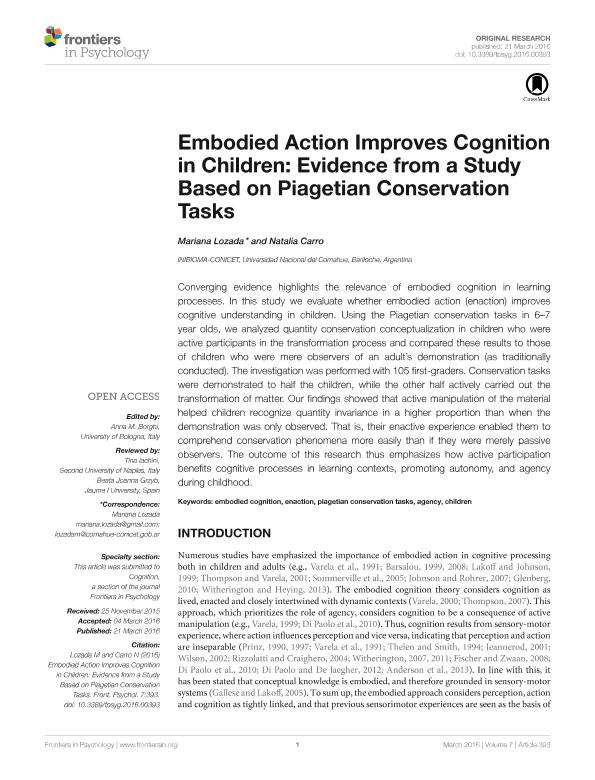Mostrar el registro sencillo del ítem
dc.contributor.author
Lozada, Mariana

dc.contributor.author
Carro Regalado, Natalia Denisse

dc.date.available
2018-11-21T16:46:19Z
dc.date.issued
2016-03
dc.identifier.citation
Lozada, Mariana; Carro Regalado, Natalia Denisse; Embodied action improves cognition in children: Evidence from a study based on piagetian conservation tasks; Frontiers Media S.A.; Frontiers in Psychology; 7; 3-2016; 1-7
dc.identifier.issn
1664-1078
dc.identifier.uri
http://hdl.handle.net/11336/64845
dc.description.abstract
Converging evidence highlights the relevance of embodied cognition in learning processes. In this study we evaluate whether embodied action (enaction) improves cognitive understanding in children. Using the Piagetian conservation tasks in 6-7 year olds, we analyzed quantity conservation conceptualization in children who were active participants in the transformation process and compared these results to those of children who were mere observers of an adult's demonstration (as traditionally conducted). The investigation was performed with 105 first-graders. Conservation tasks were demonstrated to half the children, while the other half actively carried out the transformation of matter. Our findings showed that active manipulation of the material helped children recognize quantity invariance in a higher proportion than when the demonstration was only observed. That is, their enactive experience enabled them to comprehend conservation phenomena more easily than if they were merely passive observers. The outcome of this research thus emphasizes how active participation benefits cognitive processes in learning contexts, promoting autonomy, and agency during childhood.
dc.format
application/pdf
dc.language.iso
eng
dc.publisher
Frontiers Media S.A.
dc.rights
info:eu-repo/semantics/openAccess
dc.rights.uri
https://creativecommons.org/licenses/by-nc-sa/2.5/ar/
dc.subject
Agency
dc.subject
Children
dc.subject
Embodied Cognition
dc.subject
Enaction
dc.subject
Piagetian Conservation Tasks
dc.subject.classification
Otras Ciencias Sociales

dc.subject.classification
Otras Ciencias Sociales

dc.subject.classification
CIENCIAS SOCIALES

dc.title
Embodied action improves cognition in children: Evidence from a study based on piagetian conservation tasks
dc.type
info:eu-repo/semantics/article
dc.type
info:ar-repo/semantics/artículo
dc.type
info:eu-repo/semantics/publishedVersion
dc.date.updated
2018-11-13T20:34:42Z
dc.journal.volume
7
dc.journal.pagination
1-7
dc.journal.pais
Suiza

dc.journal.ciudad
Lausana
dc.description.fil
Fil: Lozada, Mariana. Consejo Nacional de Investigaciones Científicas y Técnicas. Centro Científico Tecnológico Conicet - Patagonia Norte. Instituto de Investigaciones en Biodiversidad y Medioambiente. Universidad Nacional del Comahue. Centro Regional Universidad Bariloche. Instituto de Investigaciones en Biodiversidad y Medioambiente; Argentina
dc.description.fil
Fil: Carro Regalado, Natalia Denisse. Consejo Nacional de Investigaciones Científicas y Técnicas. Centro Científico Tecnológico Conicet - Patagonia Norte. Instituto de Investigaciones en Biodiversidad y Medioambiente. Universidad Nacional del Comahue. Centro Regional Universidad Bariloche. Instituto de Investigaciones en Biodiversidad y Medioambiente; Argentina
dc.journal.title
Frontiers in Psychology
dc.relation.alternativeid
info:eu-repo/semantics/altIdentifier/doi/https://dx.doi.org/10.3389/fpsyg.2016.00393
dc.relation.alternativeid
info:eu-repo/semantics/altIdentifier/url/https://www.frontiersin.org/articles/10.3389/fpsyg.2016.00393/full
Archivos asociados
